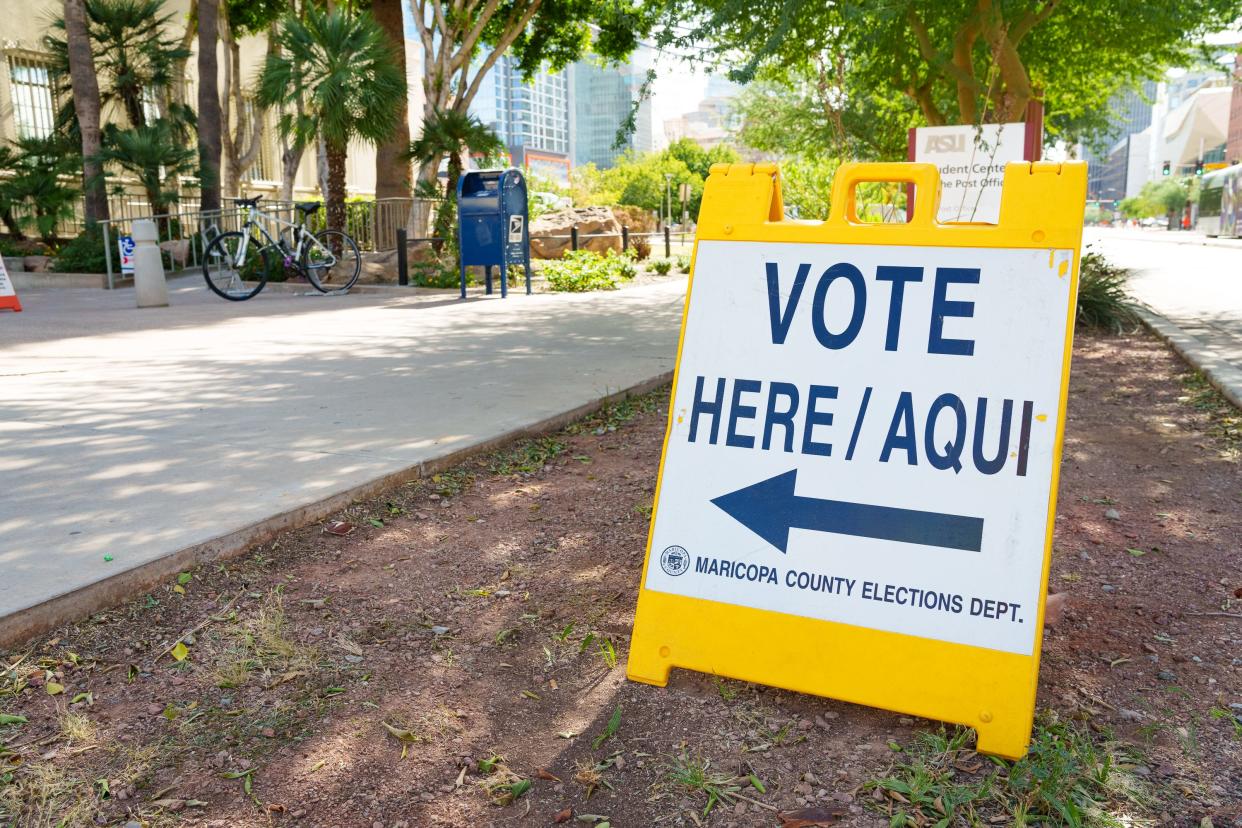Goldwater says ballot measure site is 'resource to educate.' Others disagree

A new Goldwater Institute website says Arizona's ballot initiative process should require signatures from all parts of the state, an idea the libertarian think tank bills as a "fair and balanced" approach to the main way citizens can shape state law.
A spokesperson for Goldwater calls the website "a resource to educate Arizonans about the ballot initiative process."
That resource educates Arizonans not about existing ballot initiative processes, however, but about procedures that would be put in place if a majority of voters approve a question on their November ballots.
The website falls into a murky area of law when it comes to backing ballot measures, one that is often sorted out through formal complaints or legal challenges. It also signals the sometimes behind-the-scenes and often carefully crafted push by special interests to sway public opinion in the 2024 election cycle that is already here.
Election interference charge: 2 Cochise County supervisors indicted by grand jury
Arizonans are likely to see many similar websites in the next 11 months that toe a legal line between advocating for a broad issue and a specific ballot measure.
"This is not just an education piece about how current initiatives work," said Sen. Priya Sundareshan, D-Tucson, who does not support changing the initiative process.
Goldwater spokesperson Joe Setyon did not answer questions about whether the group would put more money behind its campaign beyond launching azballotfairness.com. Setyon also would not say if the website is an early effort in support of the ballot measure lawmakers referred to voters earlier this year — with Goldwater's backing.
Republican lawmakers in the Arizona Legislature approved Senate Concurrent Resolution 1015, which puts a question on the November ballot that would change signature-gathering requirements for citizen initiatives to include a percentage of voters in each of 30 legislative districts. Current law requires a percentage of voters statewide.
In Arizona, citizens — who often join together to create political coalitions — can run campaigns to amend state law or the constitution. To do this, they must gather a certain number of voter signatures to get their proposal on the ballot. Lawmakers by a majority vote can also send questions to the ballot through a legislative referral.
Republicans supported the resolution as bringing fairness to the initiative process. Democrats opposed it wholesale as an attempt to make it harder for citizens to access the ballot.
Goldwater lobbyist Jenna Bentley testified in favor of the ballot measure, lamenting to lawmakers in February that "rural counties have very little say" in what makes it onto the ballot.
Goldwater's new website levies a host of complaints about the current process and says reform would prevent special interests outside of Arizona from funding ballot measures, naming as an example Proposition 127. That 2018 measure, the most expensive in state history, would have required utilities to use renewable energy sources and was funded by a California billionaire.
But Proposition 127 did not pass.
“The fact that their big concern is a measure that failed really highlights they would rather put up the hurdles to block voter initiatives from even making it to the ballot rather than giving voters the choice," Sundareshan said.
The fuzzy legal line at issue
Even experts can debate whether websites like Goldwater's are considered to be a ballot measure expenditure under state law, which would require additional disclosure on the website and public reporting in the state campaign finance system. The law requires the ballot measure must be "clearly identified" to trigger that reporting threshold.
Advocating for broad issues is allowed under the law without the same disclosure requirements, according to Jim Barton, a Democratic election attorney and partner at Barton Mendez Soto in Tempe who has worked on several statewide ballot measures.
"It's going to be rare you're going to hear me stick up for the Goldwater Institute," Barton said, adding that the website probably could be considered issue advocacy.
But Terry Goddard, a former Democratic attorney general, said he was "skeptical" and that the website appeared to expressly advocate for the specific ballot measure.
"From reading it, I thought it was close enough that it would not pass the sniff test to say this is just about propositions and not about this specific proposition," he said.
But Goddard said the webpage was clear political advertising that could trigger provisions of Proposition 211, a measure approved last year by 72% of voters that sheds light on political spending. The measure broadens the public reporting done by political groups and their funders on campaign media spending, including websites for candidates and ballot measures.
If Goldwater's statewide political spending reaches a $50,000 threshold in the 2024 cycle, Proposition 211 would require the group to disclose contributors over $5,000, something Goldwater has resisted. Goldwater, which also operates a law firm, has filed a lawsuit challenging Proposition 211.
Reach reporter Stacey Barchenger at stacey.barchenger@arizonarepublic.com or 480-416-5669. Follow her on Twitter @sbarchenger.
This article originally appeared on Arizona Republic: Goldwater website toes legal line on ballot measure campaigns

